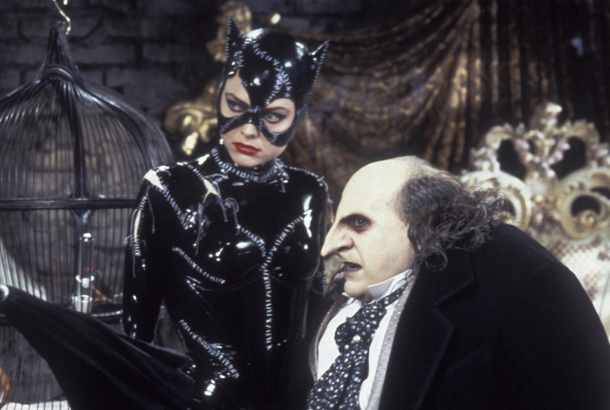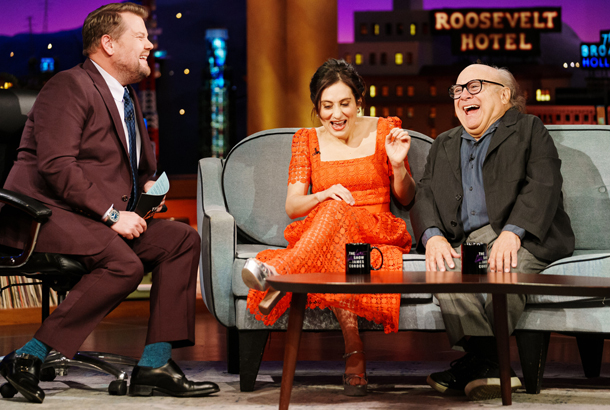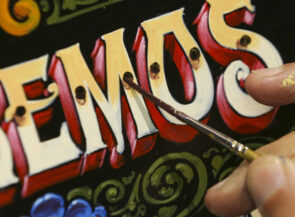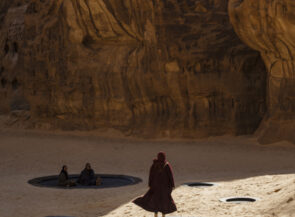The beloved funnyman heads to Broadway—and brings along his daughter—for the new play I Need That
The onscreen Danny DeVito remains a marvel of engineering. A dynamo of pressurized swagger—it’s said his close friends call him “a Tasmanian devil”—the compact actor has projected outsize charisma and infectious guile throughout a rogues’ gallery of antiheroes that includes comic-book villain the Penguin in Tim Burton’s Batman Returns, neo-noir dirt columnist Sid Hudgens in L.A. Confidential, and baroquely sociopathic small-time crime boss Frank in It’s Always Sunny in Philadelphia. In a sense, all these characters descend from the role in Taxi that launched DeVito’s career in 1978: cab dispatcher Louie De Palma, an unflappably rude, lewd, bad boss par excellence, who rules with exuberant sleaze from high in his caged office roost.

The real DeVito is something else entirely: a family man (he has three kids with actress Rhea Perlman) and film producer who’s happy to descend from his Hollywood perch and who, at age 78, is enjoying a late-career renaissance on the stage. This fall, he’ll appear on Broadway with his daughter Lucy in Roundabout Theatre Company’s production of Theresa Rebeck’s new play I Need That. DeVito plays widower Sam, a man trapped—literally and psychologically—by the clutter of his dead wife’s possessions. When the disorder brings a threat of eviction, Sam’s daughter, Amelia, forces him into an abrupt, Marie Kondo–style reorganization, prompting an eternal struggle over what remains and what must go. The play comes six years after DeVito’s Broadway debut—a revival of Arthur Miller’s The Price, in which he played a kvetchy, beleaguered used furniture dealer. The New York Times toasted his entrance, writing “he makes a meal of the scene and then eats a hard-boiled egg for an encore,” and the experience left him hungry for more.

While the actor has been gravitating toward more intimate performance spaces, the extended DeVito universe has spread into strange environs. The lunatic fringe includes fans who wear giant DeVito tattoos on their bodies, high-school seniors who bring cardboard effigies of him to the prom, and page after Amazon page of Danny DeVito–themed DIY gifts and products, including the extremely unofficial The Semi-Erotic Adventures of Danny DeVito: The Coloring Book—a title that draws an all-accepting sigh from its inspiration, who’s calling from California. “It’s always good to be part of the mix,” DeVito says of such oddball honorifics, “but if you want the real thing, you gotta come see me onstage.”
Your new play features your character’s long-suffering daughter, played by your long-suffering daughter. Coincidence?
[Chuckles.] Well, Lucy’s been serious about acting since high school, and she’s willing to suffer for her art. I think the first thing I saw her in was a high school production of a Neil LaBute play.
Seeing your young daughter in a LaBute play sounds terrifying.
Oh, I was enthralled by it, just seeing her passion and commitment. I’ve also seen her do great silly things, other plays, a whole range of work in this really nice progression that’s brought us to this point. Rhea and I were always very open about the business, always talking about everything we do in our work. Lucy, Rhea, and I, we’re the crazy actors in the family, and theater is this great opportunity to work together. What brought you back to the stage? I’ve done theater from, like, the birth, decades ago in New York, and lately I’ve been having these little opportunities to go back. I did a couple of little things in LA, did [Neil Simon’s] The Sunshine Boys in the West End a while back, then The Price with Roundabout in 2017. All those experiences were so fun they really left me wanting more. When everything shut down during the pandemic, Lucy and I did a benefit for people she knew, performed a funny little scene on Zoom together.
Was this the one with the amazing title, I Think It’s Worth Pointing Out That I’ve Been Very Serious Throughout This Entire Discussion or, Julia and Dave Are Stuck in a Tree?
That’s the one, by Mallory Jane Weiss. A wonderful little play about a father and daughter on a ski trip who have a kind of… encounter with the slope. We had such a great time doing it, even on Zoom, that we got to chatting with the director, Moritz von Stuelpnagel, and we all decided we’d like to do something else together. Moritz mentioned this to Theresa Rebeck, and it evolved very organically from there.
The new play comes a decade after you first stepped back onto the boards in The Sunshine Boys, in which you starred opposite the colossal comic presence that was English actor Richard Griffiths. Did any of this cause jitters?
Well, it all happened so casually. Here I’m doing Always Sunny every week, every year, just trucking along. Then Rob [McElhenney] and Kaitlin [Olson] decide to have a baby, and we were gonna take a pause. Then, out of the blue, somebody offers me a part on the stage in London. So I go, “Oh, my goodness, let me really give this a serious look.” I mean, before that, the last time I was on stage was Off-Broadway at the Mercer Arts Center in, like, the early ’70s. But the thing about Taxi was that we did the show in front of an audience every Friday night, so it’s not like I’d been cloistered away from an audience. I knew that the audience always makes things better—getting feedback and making adjustments. So doing that every Friday night for five years was like having a long-running Off-Broadway show.
Was doing theater with Griffiths in the West End as awesome as it sounds like it would be?
Oh, we had a ball. We had a great time. It was at the Savoy Theatre, this beautiful landmark building on the Embankment, but there were 70 steps down from the stage door to the stage proper. So twice on Wednesday, twice on Saturday, eight shows a week, we’d have to climb 70 steps each way. Richard actually used to go up and down much more than I did, because you couldn’t smoke in the theater. But after the show, we’d have gin in the dressing room. Oh yeah… He got me into drinking gin and lime. He had assistants squeeze up a bunch of limes—we’d mix [the juice] half-and-half with Tanqueray, then shake it up. You know, a serious booze drink, very British. God, I miss him so much.
Were you always into theater?
As a kid? Not at all. I never saw a play, never read a play. I just went to the movies all the time. I lived in Asbury Park, New Jersey, where there were five movie theaters in town, not to mention the drive-in. Every Friday, Saturday, and Sunday I’d either be on the beach or in a movie theater.
I read that you sort of backed into acting via the stage door: You were working at your sister’s New Jersey beauty shop, and she sent you to get training in stage makeup, to expand her business.
She was 16 years older than me and really a force of nature—almost like the matriarch of our family. She was running a beauty shop, where I worked for her, and she wanted to expand into stage makeup, so she sent me to a makeup instructor at the American Academy of Dramatic Arts, who had me enroll as a student there so I could get lessons from her at work. But once I was there, the acting took over the makeup classes. I just got fascinated by the people and the process. I enrolled full-time, and after graduation I left my sister, rented a place on 30th and Madison for $12 a week, and began my career as an actor—summerstock, local productions, some Off-Off-Broadway plays.
Eventually, you got a part in the stage version of Ken Kesey’s One Flew Over the Cuckoo’s Nest, which led to the film, in which you played psychiatric ward inmate Martini. What roles do you remember before that?
Let’s see, one of my first equity jobs was this play called Shoot Anything With Hair That Moves. I played a drug dealer, and his name was Frank. The big scene was in this one room with two girls in the apartment, and there’s a knock on the door, and they open it to reveal a guy standing there holding somebody in his arms. At first, you think this guy must be passed out or something, but the guy comes in, carrying me, and sets me down on the sofa, where I go ahead and make the deal. It was a nice, funny scene, a little back and forth, and when it’s over the guy picks me up and—
Was your character incapacitated in some way?
OK, OK, I’m getting to the joke!
Sorry!
So we make the deal, I take the money, we say goodbye, the guy picks me up, and we both leave. Then one of the girls says, “Geez, Frank is such a nice guy. It’s too bad he can’t walk.” And the other girl says, “Oh, he can walk. He just doesn’t have to.”
Nice. It couldn’t have been long after that you met Rhea. She was in the audience for a play you were in, 1971’s The Shrinking Bride, and two weeks later you moved in together. What was the magic role?
It was a comedy of manners about class difference, set on a stately mansion estate whose nouveau-riche owner wants to marry his daughter off to this upper-class British guy she doesn’t like.
Which one did you play?
I played the stable boy.
Now we’re talking.
That’s right, I played this almost feral, animalistic guy who lives in the stables and takes care of the livestock. He has a wild, magnetic attraction for the younger daughter, who was played by an actress friend of Rhea’s, Diana Simkin. My first line, I’m standing with a rake on my shoulders, right at the imprint of the stage. Diane comes out and says, “Hey Richie. What are you doing?” And I say [big
pause], “I’m spittin’ on the swans.”
Now, 50 years later, Rhea is closing a run at Lincoln Center and then handing New York theater over to you and Lucy with I Need That. Any idea how all this came to pass?
I mean, in this jungle we all have to live in, with the highs and lows, the ins and outs, the big thing is love. You gotta have love: That’s the big thing. Whether you’re starting out as an actor or you’re finishing up as something else, love’s the thing that will get you through.




